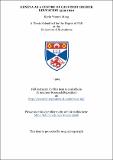Files in this item
Geneva as a Centre of Calvinist higher education 1559-1620
Item metadata
| dc.contributor.advisor | Pettegree, Andrew | |
| dc.contributor.author | Maag, Karine Yvonne | |
| dc.coverage.spatial | 244 p. | en_US |
| dc.date.accessioned | 2018-05-30T08:24:53Z | |
| dc.date.available | 2018-05-30T08:24:53Z | |
| dc.date.issued | 1994-07 | |
| dc.identifier.uri | https://hdl.handle.net/10023/13598 | |
| dc.description.abstract | This thesis examines the provision of higher education in a Calvinist setting in 16th century Europe. The change from Catholicism to Protestantism made it imperative to remodel existing centres of higher education, or to create new ones, in order to train the first generations of Protestants for civil and ecclesiastical posts. In particular, ministers were urgently needed for the expanding number of congregations across Europe. By analysing the example of the Genevan Academy, founded in 1559 by Calvin, one can observe the operation of one of these new centres of learning in the 16th and early 17th centuries. Based on magisterial and ministerial records, together with letters discussing students and training, this study, in contrast to institutional history, examines Reformation higher education from the perspective of its participants, namely students, professors, ministers and magistrates. As Geneva acted as a centre of refuge and advice for Protestants across Europe, its role as a pre-eminent centre of Calvinist higher education simply reinforced the city's reputation. Yet the existence of the Academy between 1559 and 1620 was not without tension, particularly between the Genevan ministers and magistrates, each of whom had different expectations regarding the Academy's ultimate purpose. While the ministers saw the Academy as a humanist seminary, the magistrates wanted to expand its scope to include subjects such as law and medicine, bringing the Academy closer to a university model. Indeed, Geneva's Academy was not the only Calvinist centre of higher learning attracting students in the later Reformation period. Zurich's academy, and the universities of Heidelberg and Leiden, though each differed in structure and approach, provided alternative and sometimes competing forms of higher study. Through an examination of these other centres of learning and of their students, one can assess more effectively what role Geneva's institution played in the European Reformed educational world. | en_US |
| dc.language.iso | en | en_US |
| dc.publisher | University of St Andrews | |
| dc.subject.lcc | BX9418.G3M2 | en |
| dc.subject.lcsh | Calvin, Jean, 1509-1564--Influence | en |
| dc.subject.lcsh | Calvinism--History | |
| dc.title | Geneva as a Centre of Calvinist higher education 1559-1620 | en_US |
| dc.type | Thesis | en_US |
| dc.contributor.sponsor | University of St Andrews | en_US |
| dc.contributor.sponsor | Sir Harold Mitchell Fund | en_US |
| dc.type.qualificationlevel | Doctoral | en_US |
| dc.type.qualificationname | PhD Doctor of Philosophy | en_US |
| dc.publisher.institution | The University of St Andrews | en_US |
This item appears in the following Collection(s)
Items in the St Andrews Research Repository are protected by copyright, with all rights reserved, unless otherwise indicated.

